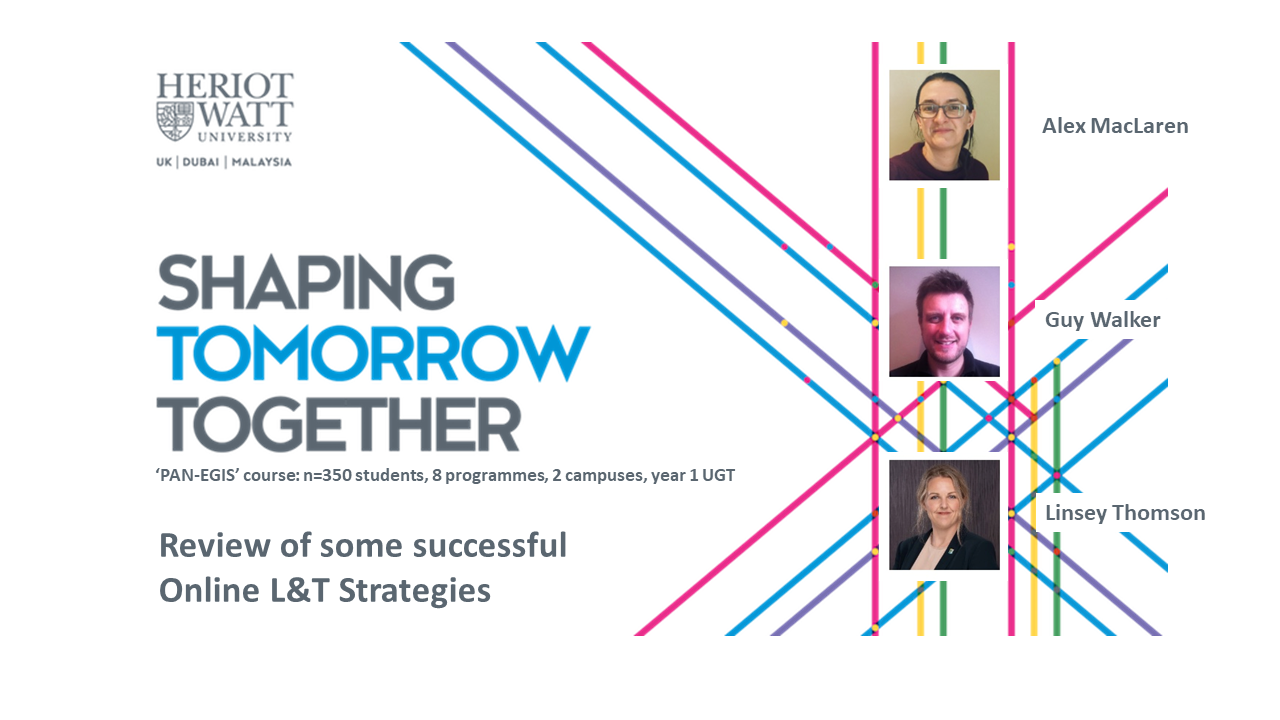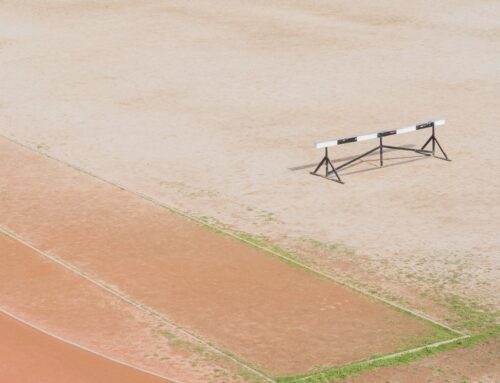Reflecting on the unexpected opportunities provided by lockdown, Prof. Guy Walker from the School of Energy, Geoscience, Infrastructure and Society, explains how they have used the wicked problem of climate change to problem-based learning to their new students across the school.
It was Churchill who coined the phrase “never waste a good crisis”. The horrific impact of COVID-19 required a response from education. The solution to learning in lockdown – the only solution really – was to innovate our way around the challenges. In other words, to take Strategy 2025 at its word. Those words are about being outward looking pioneers of education, pursuing knowledge for the benefit of society and the world, and a distinctive learning experience enhanced by global connectivity. The natural solution, then, was a pan-EGIS ‘mega-course’ upon which every one of our 350 new undergraduates would be enrolled; across eight major discipline areas spanning Brewing and Distilling, Biology, Construction to Geography, Civil and Architectural Engineering; straddling both the Dubai and Edinburgh campuses. Developing a problem-based learning course, we landed upon the most essential ‘wicked problem’ facing us all today: Climate Change. The course could only really be called one thing: ‘Shaping Tomorrow Together’.
Creating the conditions
Educationalist Sir Ken Robinson says of education that it is like agriculture. Universities are not factories. Despite rumours to the contrary we do not have a conveyor belt and we do not produce machines who can pass exams. It is more like farming. We create the conditions for human talent to flourish. The creation within EGIS of a Leader of Pioneering Education role, and a Pioneering Education team, was about creating those conditions for staff and students.
For staff, Pioneering Education was about celebrating the talents we already have in abundance and inspiring them to flourish. The pan-EGIS mega course is an extreme manifestation of this. Probably the biggest surprise is that the EGIS leadership team of Prof Malcolm Chrisp, Prof Fiona Grant and Prof Sebastian Gieger agreed to support this bold adventure. Not only did they agree, they were delighted to support behaviours which allowed Heriot-Watt values to be lived. In other words, they said ‘go for it’. As a result, the learning objectives from no fewer than twelve year one courses were subsumed, freeing a dozen or more course leaders from having to revert their courses to RBL and deliver them. A considerable workload saving for staff at a time when it was most needed.
For students, the course creates the conditions for their talents to flourish and their resilience to grow. This occurs as one academic community and is centered around EGIS’ unifying purpose of sustainable development. Course Leader Alex Maclaren has used her prior experience with large-classes to design an ingenious Challenge-Based syllabus which uses Responsive Blended Learning (RBL) as a key strength. This is not a case of having to apologise to students for not being able to sit in lecture theatres for hours on end. The course could not run without Blackboard’s Collaborate Ultra and Microsoft Teams-based gymnastics. Neither could it run without a healthy dose of RBL judo in the form of flipped classrooms. Shaping Tomorrow Together is ‘digital first’ but on-campus activity can easily expand and contract depending on circumstances. As it turns out, demand for on-campus sessions is low. How do we know? Because the course is strongly student-led and we asked (and continue to ask) students.
Teamwork
The main delivery team consists of Course Leader Alex Maclaren, Guy Walker and Linsey Thomson. Team teaching lies at the core, and live lectures to 350 students are hosted simultaneously from Edinburgh and Dubai. In support are 12 EGIS PhD students and RAs who work with small teams of students who, for the purpose of the course, represent a country who will present their discipline-informed solutions to climate change at COP26. While the main course delivery team are far from retirement age, it is fair to say that the PhD students provide a welcome injection of youth and vibrancy into the learning experience. More importantly they bring to bear, in a very direct way, their own vibrant research interests.
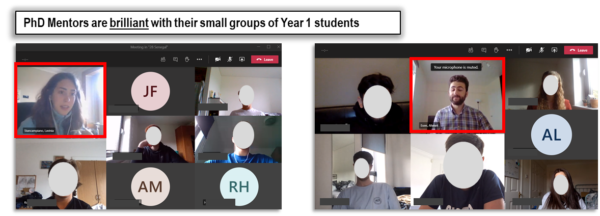
Running alongside are discipline specific activities delivered by excellent colleagues in Biology, Civil Engineering, Architecture, Urban Planning, Geography and Construction. We expect, and indeed hope, that some students will ask “what has climate change got to do with my discipline?” This is because discipline teams are briefed and on standby to give a direct and unambiguous answer. Staff have bought in to this approach. We all agree that the solution to society’s biggest challenges is to quite literally ‘Shape Tomorrow Together’.
Inspirational Learning
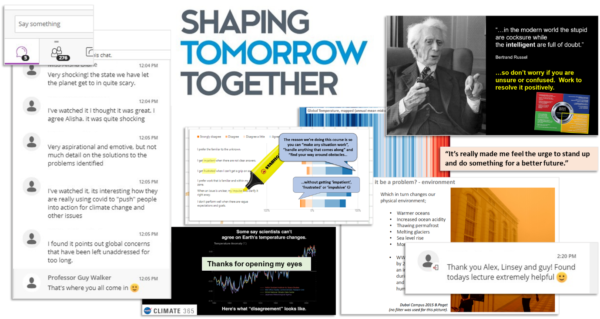
The Heriot-Watt Learning and Teaching Strategy is called Inspiring Learning. It is about developing a distinctive approach; positive education; an experience that is exciting and fulfilling, for both staff and students; a focus on wellbeing; and an emphasis on application and collaboration. Consolidation week has dawned and the roller-coaster journey pauses. Looking back down the tracks what do we see so far on the EGIS mega-course? We see some fantastic young people who are highly engaged in debates around climate change and with real passions for their chosen subjects.
We see students who are expecting:
“meetings of minds. Collisions of cultures. Lightbulbs and bright sparks. Ideas and inspirations. Musings and muses” (student feedback, 2020).
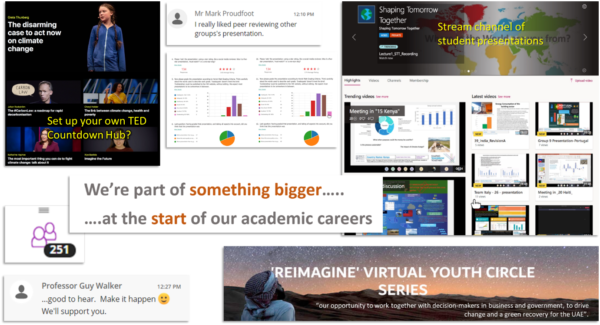
Students who have told the teaching team that
“It’s really made me feel the urge to stand up and do something for a better future” (ibid).
Students who have anxieties and worries about academic skills like presenting, who we have been able to help with reflective learning techniques. And students who, as a community, attend online en-masse, are engaged with their small groups, and 90% of whom submitted their first assignment correctly and on time. Above all, what we see are glimpses of the future of education and a crisis not wasted.
The project team explain more about the EGIS ‘Shaping Tomorrow Today’ project in this video (6m30s)
All images (c) Heriot-Watt University

